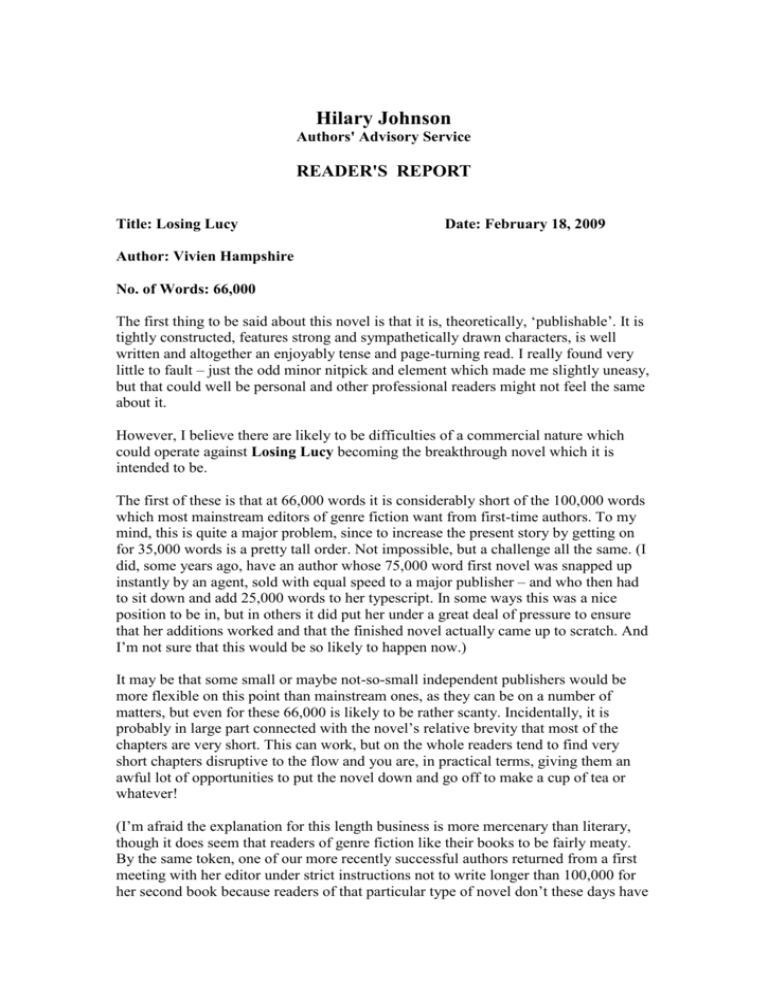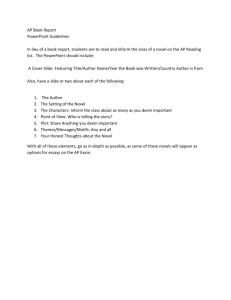Hilary Johnson - Writers' Forum
advertisement

Hilary Johnson Authors' Advisory Service READER'S REPORT Title: Losing Lucy Date: February 18, 2009 Author: Vivien Hampshire No. of Words: 66,000 The first thing to be said about this novel is that it is, theoretically, ‘publishable’. It is tightly constructed, features strong and sympathetically drawn characters, is well written and altogether an enjoyably tense and page-turning read. I really found very little to fault – just the odd minor nitpick and element which made me slightly uneasy, but that could well be personal and other professional readers might not feel the same about it. However, I believe there are likely to be difficulties of a commercial nature which could operate against Losing Lucy becoming the breakthrough novel which it is intended to be. The first of these is that at 66,000 words it is considerably short of the 100,000 words which most mainstream editors of genre fiction want from first-time authors. To my mind, this is quite a major problem, since to increase the present story by getting on for 35,000 words is a pretty tall order. Not impossible, but a challenge all the same. (I did, some years ago, have an author whose 75,000 word first novel was snapped up instantly by an agent, sold with equal speed to a major publisher – and who then had to sit down and add 25,000 words to her typescript. In some ways this was a nice position to be in, but in others it did put her under a great deal of pressure to ensure that her additions worked and that the finished novel actually came up to scratch. And I’m not sure that this would be so likely to happen now.) It may be that some small or maybe not-so-small independent publishers would be more flexible on this point than mainstream ones, as they can be on a number of matters, but even for these 66,000 is likely to be rather scanty. Incidentally, it is probably in large part connected with the novel’s relative brevity that most of the chapters are very short. This can work, but on the whole readers tend to find very short chapters disruptive to the flow and you are, in practical terms, giving them an awful lot of opportunities to put the novel down and go off to make a cup of tea or whatever! (I’m afraid the explanation for this length business is more mercenary than literary, though it does seem that readers of genre fiction like their books to be fairly meaty. By the same token, one of our more recently successful authors returned from a first meeting with her editor under strict instructions not to write longer than 100,000 for her second book because readers of that particular type of novel don’t these days have the staying-power for more than that! But anyway, what most aspiring authors do not have in mind, and why would they, are matters such as production costs, not all that much more for a 100,000 words novel than for a shorter one, retail price, likely to be pretty much the same for both books, and the difficulty of persuading bookshop browsers to try new authors, especially when there could be a perception that they are not getting all that much book for their money. Clearly, editorial decisions are not always exclusively dictated by financial considerations, but these are so important in contemporary publishing and the obstacles facing new authors so many, that it’s as well not to provide an editor with an avoidable reason to reject.) So, I do see this as a negative which is likely to influence an agent’s or editor’s decision, especially when she might have in her pile of submissions a couple of other strong contenders which do fit the bill in that regard. My second concern is that it is quite difficult to categorise this novel other than as a type of thriller. In most professional readers’ eyes the theme of a stolen baby equates to a thriller, albeit perhaps the sub-genre of psychological thriller. I know you have said that Losing Lucy is not a thriller and I can see what it is you are seeking to do in exploring the lives and psyches of the principals involved in this always terrifying scenario. However, I certainly jumped to the conclusion upon initially looking at the first chapter that I was reading a thriller and I understand that some other readers did the same. The fact is that agents or editors reading through a lot of typescripts are prone to make snap decisions, usually if not invariably correct ones born from long experience. The risk in my view is that not only would they think they were dealing with a thriller, but, rather more worryingly, they would be aware that some pretty high profile authors have written novels based on this highly emotive theme of the snatched baby and particularly conscious of Sophie Hannah’s Little Face, which is, if I may say so, a novel which is rather more sophisticated both in concept and overall ‘feel’. And, actually, isn’t this a story which is a combination of ‘find the baby’ and ‘what will happen to the baby?’ and therefore dependent in quite large measure for its effect upon the sort of tensions which are characteristic of a psychological thriller? I am quite prepared for some of the other people to whom this typescript is shown, most notably the agent and editor, not to share my views on either of these points, but all I can say is that I am completely confident that the agents within the agency with which I have worked for many years would, although being almost certainly complimentary about the writing, be unwilling to represent you with this particular novel as it stands and on these grounds. I also suspect that they might find the plot a little on the slight side and that, of course, is connected with the lack of length. They’d be looking for an altogether ‘bigger’ book, both literally and with regard to the story itself. As I say, maybe you’ll come across an agent or editor who thinks differently or who, perhaps, perceives a way of making Losing Lucy a more substantial novel, which would be great, though to be honest it feels to me as if it’s the length it should be and that means extremely careful thought would need to be given to expansion, if indeed expansion is a viable possibility. And I believe you have to settle firmly in your own mind the way in which you would categorise the story. 2 Let’s look now at a few of the points which struck me. The prologue. I’ve already said in our earlier correspondence that on the whole I am not keen on prologues. (Check out, if you haven’t already done so, Elmore Leonard’s deadly writing sins.) Frequently they are cut by editors anyway, and one might regard their principal purpose as enabling the author to find her way into her story, after which the prologue can be scrapped. Many prologues needlessly foreshadow – give away! – the outcome of the novel. But – there are times and this instance is probably one such, where a prologue works. I think this one does because it is so very short. (It does even in these few lines signal a thriller of some kind, but I won’t go on about that!) I’m not convinced by your emailed idea that there is a twist as to the timing of the prologue and the possibility that the entire novel might be seen as a flashback and don’t really see the point of that, particularly as immediacy is a lot more compelling than flashback. I think that is an unnecessary piece of over-subtlety and that it’s best to regard the prologue as, if anything, a flash forward – twice over, as it happens. Viewpoint. You are good at managing this. There are a few occasions when the author’s voice makes itself heard. For example: P8: Lydia was not the sort of woman who panics. P74: (Lydia having completely forgotten the promised visit to the real swings.) P163: Lydia was tired. These are all examples of authorial omniscience in a novel where you have, with very few exceptions, written from inside the head of your viewpoint character of the moment. Examples 1 and 3 might be regarded as telling instead of showing. I do tend to be very strict on this matter of narrative viewpoint and it must be said that many, many inexperienced authors have no idea how to manage it and, often, difficulty in grasping the concept. To my mind, it is crucial, especially for aspiring novelists in the early stages; what they do later when more practised and more confident may be less important. You are very clearly not an author such as I have described and your technical competence is considerable. It would be a harsh editor who would leap upon these three examples and, in any event, it is quite likely that it is more straightforward to handle them as you have done than to make strenuous efforts to remain within the consciousness of the character. There’s a shift from Gemma’s pov to Gordon’s on p135 and I’m a little less than comfortable with the viewpoint switch on p181: It was when he tried to squeeze the Yorkshires in that the store detective spotted him. Again, this is omniscience and I did find this sudden departure from Bob’s pov slightly disconcerting. But I stress that it is only very marginal. On pp191/2 there is use made of the Under Milk Wood-style device of briefly showing several of the protagonists in bed at night, but it’s nicely done, not drawnout, so I wouldn’t object to that. 3 Some editors may think that too many characters are given viewpoint status and that it might be wise to cull one or two, Bernard being an obvious candidate, but hat is something for you to think about. Really minor points: P4: You name the Prime Minister as Mr. Brown. This could potentially date the novel before you start. Even if it were to be accepted tomorrow it would be a year before it appeared on the bookshop shelves, by which time . . . well, in the present politically tricky times I don’t want to pre-empt anything, but you see what I mean! Better to be non-specific with this kind of detail. Around p8 I was several jumps ahead of the policewoman who on pp87/88 wonders if Tom, or somebody acting for him, might have taken Lucy in order to have a DNA test. Well, we were both wrong, as it turns out, and I only mention it because it was interesting that this notion did come up later. So many people these days confuse ‘slither’ and ‘sliver’. These words occur a few times in the text, correctly used, but I wasn’t too sure about ‘slither’ on p60. Around this point I did wonder a little why Julie didn’t seize the opportunity to go and deposit the baby somewhere where she would be found quickly while Bob was out, but I suppose it becomes increasingly obvious that she has difficulty in functioning in any way which might be called decisively and then, as time goes on, various problems arise which makes the possibility a whole lot less likely. It also seemed to me rather obvious that the abductors – who are very astutely perceived and drawn – are such a markedly down-market couple, but not only are they a good contrast with the other, middle-class, characters but also I don’t suppose it would work if they were not. You’ve typed Gemma instead of Lydia on p73: (Gemma) hesitated at the corner. And on p148 it should be laid, not lay her head on his shoulder. Both very small slips. It is generally advised that not too many characters are given names which begin with the same letter. With this in mind, I began to notice Lydia and Lucy, Bob and Bernard, Janet and Jean, just two names in each case and hardly reason to quibble, though we do have Gemma, Gordon and Gloria! Which brings me to the element which caused me a glimmer of unease: the medium Gloria. OK, I’m a self-confessed sceptic in these matters, which is why I was the perfect reader of submissions involving the supernatural during my time as a publisher’s reader! (As it happened, one of the imprints, now defunct, for which I read published the occasional horror story and there were a couple of submissions which I loved and did recommend for publication.) If I was convinced by something of this nature then it could be reckoned that the author had done his/her job! And for some reason I’m happier with lighter treatments of the paranormal, presumably because these don’t have to be taken too seriously. 4 You have to bear in mind that there are a lot of readers who might feel as I do, even while there are a lot who don’t. Editors are often quite cautious about the supernatural in an otherwise realistic novel; apart from anything else, it can undermine the plausibility of the whole. Admittedly, Gloria plays a relatively small role, she is not in any sense a cliché medium and more than one character shows strong disbelief in what she claims to be able to do. On the other hand, she does come up with a few things, the carrots, for instance – and oh, what a brilliant touch that is, Julie attempting to feed these vegetables to an unweaned baby; it’s pathetic and it’s scary – which she couldn’t possibly have known other than by some extraordinary means and readers are expected to believe that she could do this. I don’t want to make too much of this, because my feelings are coloured by my own attitude, though not without some awareness that such an element can be commercially questionable in novels which depend considerably for their effect upon their realism, and also because you have handled it well. But I can’t not mention it. Overall, there is a great deal to commend Losing Lucy and I did, as I say, thoroughly enjoy the novel, reading it almost at a sitting. I believe you are certainly capable of writing a novel which would find a mainstream home, but I’m afraid that it’s going to have to be bigger and stronger if you are to do that, especially in the current climate. It occurs to me that Allison & Busby have recently expanded their fiction list and that is the sort of publisher who might be worth a try with this novel, if you could just boost it up a bit word-count-wise. (Though perhaps it would be sensible to check their requirements on this point first; I haven’t yet found time to do that myself.) You never know, though, I may be entirely wrong and you will be taken under the wing of a really helpful agent and everything will work out as we would all wish. I would really like this to happen, and indeed hate having to be so negative about a novel which is light years better than most of what we see – but there again, frankness has long been the guiding principle by which I run my service and I have to say what I believe to be the truth of the situation if I am to be of help. 5








